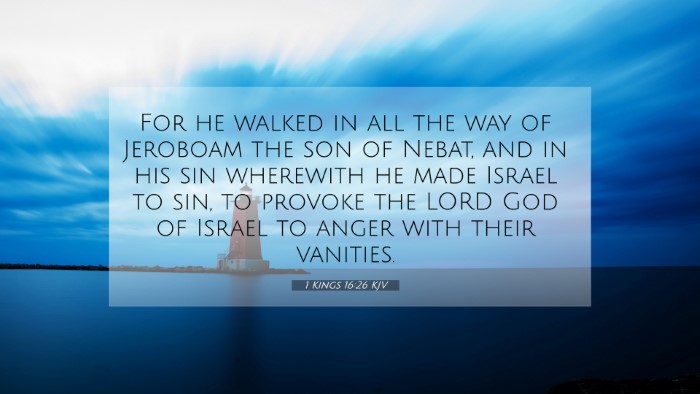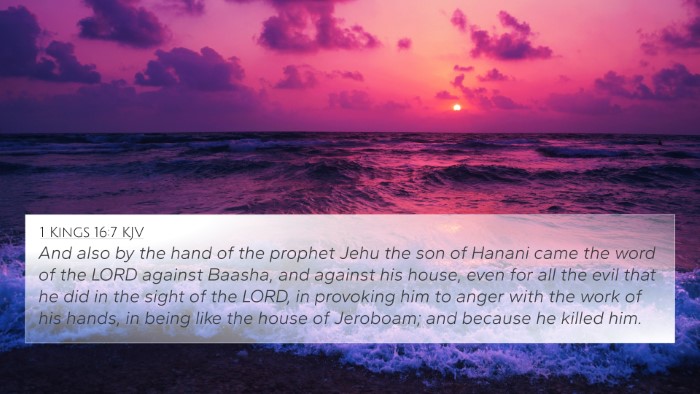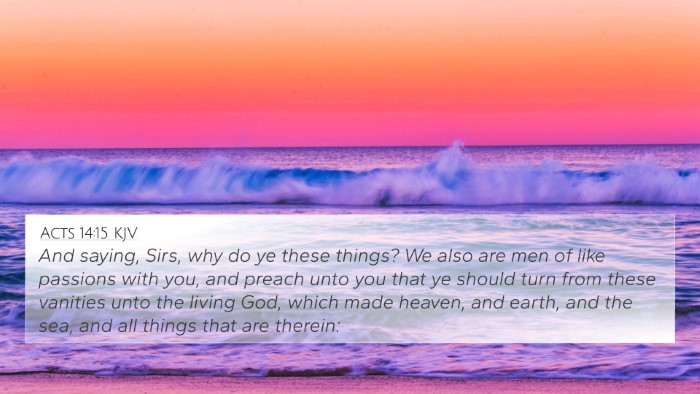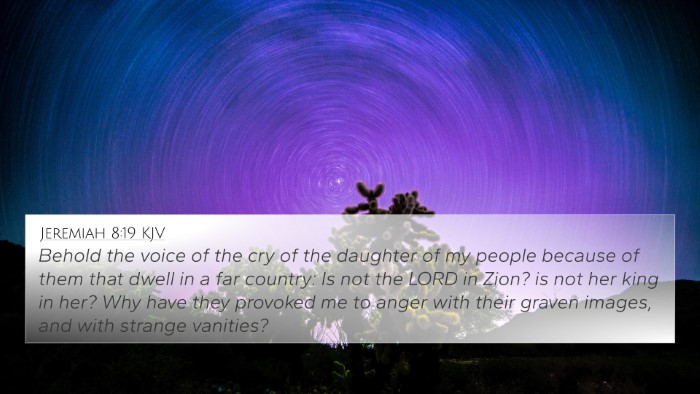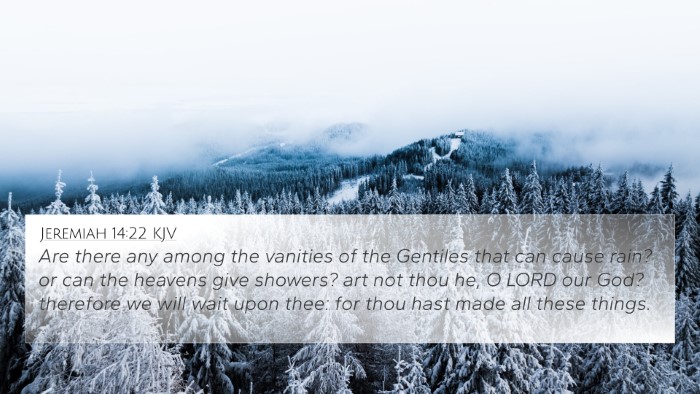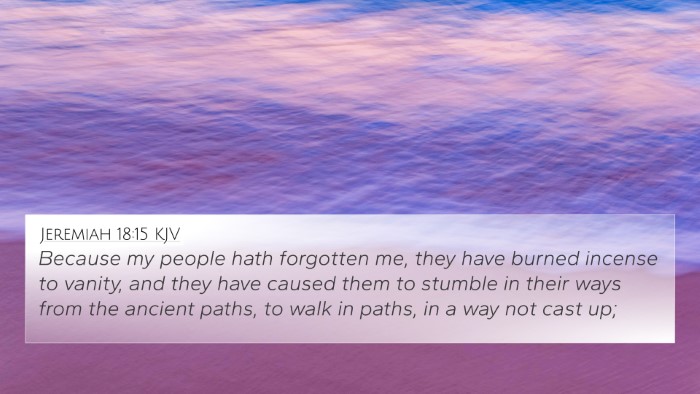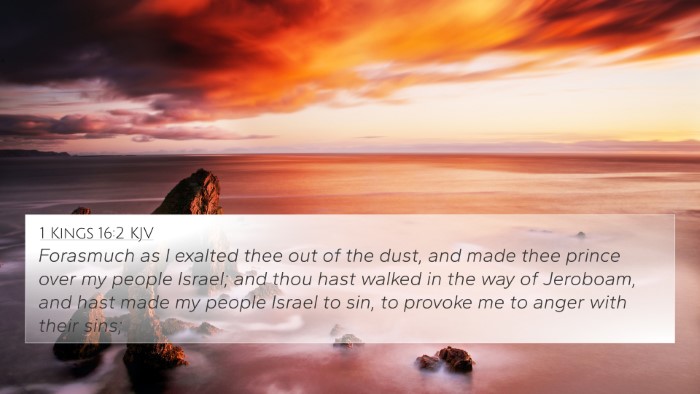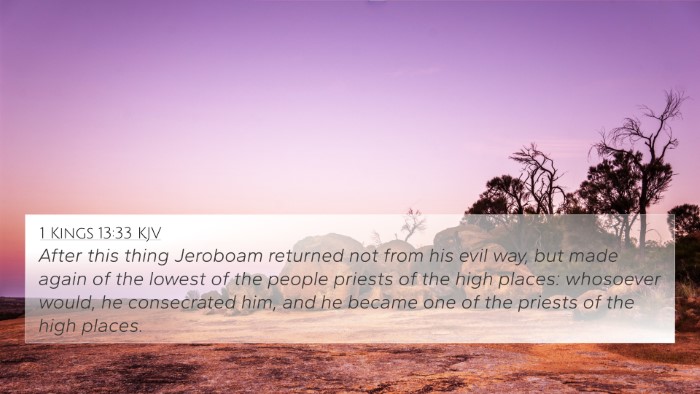Understanding 1 Kings 16:26
Verse Context: 1 Kings 16:26 states, "For he walked in all the ways of Jeroboam the son of Nebat, and in his sin wherewith he made Israel to sin, to provoke the LORD God of Israel to anger with their vanities."
Summary of Meaning
This verse underscores the spiritual and moral degeneration of Israel during the reign of King Omri. He followed the sinful practices initiated by Jeroboam, which led the nation astray from the worship of Yahweh and into idolatry. This chronicled departure from God’s commandments exemplifies a recurring theme throughout the Old Testament, where leadership profoundly influences the spiritual state of the people.
Insights from Public Domain Commentaries
Matthew Henry's Commentary
Henry highlights the significance of Omri’s actions as reflective of a broader trend in Israel's history. Jeroboam's legacy is marked by idolatry, and Omri perpetuated this legacy, leading to a grave provocation against the Lord. His reign is portrayed as embodying the spirit of rebellion against God, which often incurs divine judgment.
Albert Barnes' Notes
Barnes draws attention to the consequences of Omri’s rule and the pervasive influence of Jeroboam’s practices. He suggests that Omri’s following Jeroboam is indicative of a neglect of true worship and a commitment to vanity and sin. This observation aligns with the prophetic warnings throughout the scriptures regarding the dangers of forsaking God.
Adam Clarke's Commentary
Clarke points to the historical context of Omri’s reign, noting that his policies and actions led to significant national sins. The verse emphasizes the continuity of sin from Jeroboam to Omri, suggesting that the spiritual condition of Israel worsened as these leaders failed to lead their people towards God. Clarke also discusses the notion of “vanities,” referring to the emptiness of idolatrous pursuits compared to the glory of God.
Connections between Bible Verses
The following Bible verses relate to 1 Kings 16:26, showing the thematic connections present throughout Scripture:
- Jeremiah 16:11-12 - Discusses the sins of the ancestors that led the current generation into iniquity.
- 1 Kings 12:28-30 - Describes Jeroboam's establishment of idolatry in Israel.
- 2 Kings 17:21-22 - Speaks of the division of Israel and the ongoing sins that led to their downfall.
- Hosea 13:2 - Attributes the idolatry of Israel to the influence of leaders.
- Malachi 2:1-2 - Warns leaders about the consequences of leading people astray.
- Exodus 20:4-5 - Commandments against idols, illustrating God’s opposition to Israel’s actions.
- Psalm 106:39 - Reflects on the corruption of the people and their idolatrous behavior.
- Deuteronomy 8:19-20 - Warns against forgetting God and turning to idolatry, echoing the issues seen with Omri and Jeroboam.
- Romans 1:21-23 - Connects the rejection of God's truth to the intent of leading oneself into worthless worship.
- Revelation 3:16 - Illustrates God’s discontent with those who are spiritually lukewarm, reminiscent of Israel’s idolatry.
Thematic Analysis
This verse and its connections highlight key themes in Scripture, particularly the impact of leadership on faithfulness to God, the temptation of idolatry, and the inevitable consequences of turning away from divine commandments.
Bible Verse Cross-References as a Tool for Understanding
Utilizing a bible concordance and bible cross-reference guide can help deepen understanding of 1 Kings 16:26, as these tools assist in tracing themes and connections throughout Scripture. Studying the links between the Prophets and Apostolic teachings can reveal how these principles persist through biblical narratives.
Conclusion
1 Kings 16:26 serves as a poignant reminder of the spiritual trajectory of Israel, emphasizing the destructive power of idolatry and the importance of godly leadership. By engaging with cross-referencing methods and exploring parallel verses, believers can enhance their understanding and application of these biblical truths in their lives.


